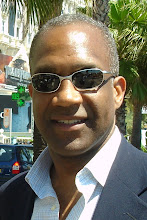Today's reading, by Johann Christoph Arnold, contained a thought that eluded me in the two other times I've read Arnold's article: The angelic heralds' first words to the frightened recipients of God's grace were often, "Fear not."
Particularly in the biblical accounts of Jesus' birth, where Mary, the shepherds, and Zechariah the father of John the Baptist (see Luke 1 and 2) are told by the glorious messenger of God to "fear not." It was, in Arnold's words, "a declaration of war on fear."
Our society is fixed -- even motivated -- by fear (something of which I am reminded after only 20 minutes of television viewing). Advertisements for the evening news invite the fixation of our eye balls on their broadcast to learn of the latest place, person, or thing to fear; as other commercials on the same channel play on our fears of social irrelevance, physical illness, or financial instability to motivate us to call for help.
We've become so accustomed to living in a culture of fear that we think it to be as normal as it is inevitable. Yet, the antecedent to the Advent message are the words: "Fear not." In those two simple words -- whether spoken as a command or as a gentle admonition -- is a declaration of war on all that fixes our attention on things other than the eternal; on all that motivates us to "double-down" in a wager that eventually loses.
When I think for a minute what I could accomplish, where I would go, what I would say, were I not afraid for myself, I begin to see what God offers each of us when we abandon our fears to Him. What was true then of the young Mary, the simple shepherds, and the learned priest Zechariah is still true today. But only for those who are willing to join the war against fear.



